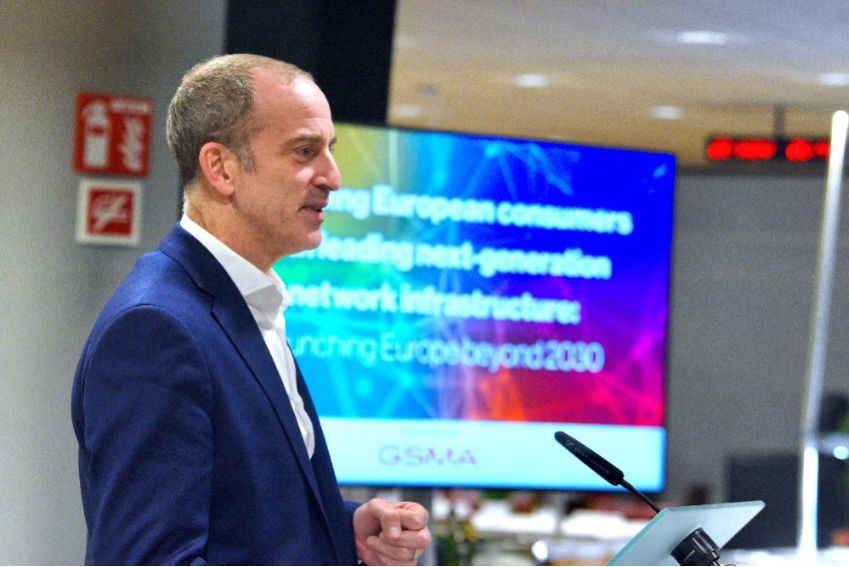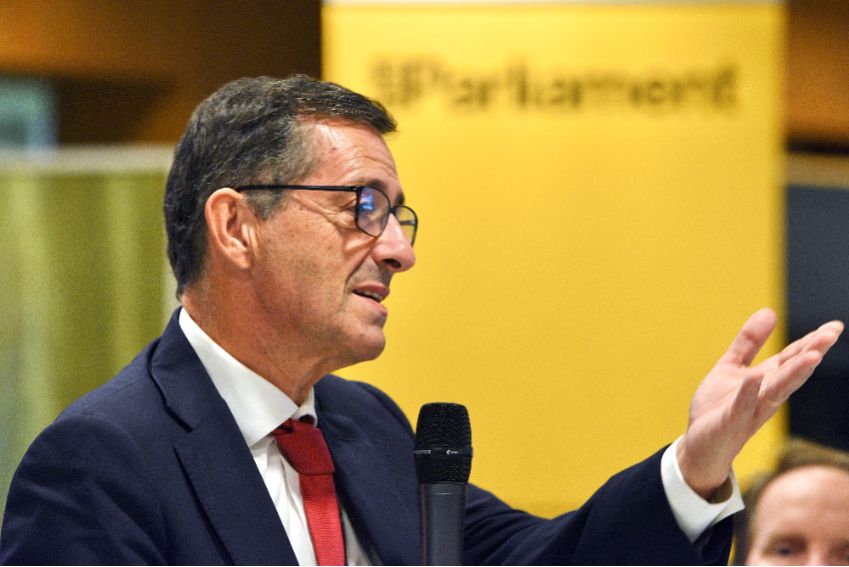“Europe is far from reaching its connectivity targets for the Digital Decade and lags significantly behind other developed regions in digital connectivity and digital services for businesses and consumers.” This stark warning about the state of 5G rollout in Europe was delivered by Calvin Baier, Chief Economist at GSMA Intelligence, at a recent dinner hosted by The Parliament.
Europe was once a connectivity powerhouse, but recent developments in network technology have caused it to fall behind other parts of the world. “The connectivity ecosystem is in Europe, and we’ve been at the forefront,” Vodafone Group Chief Economist Ben Leshner reminded the audience. After the creation of 3G, most of its early use was in Europe. But this percentage dropped rapidly as subsequent generations of mobile technology were introduced. Of the first 500 million users of 4G technology, only 11% were from the EU, and a similar situation was seen with the launch of 5G. Of the first 500 million users of 5G, only 4% were from the EU, and 71% were from China. If we expand this figure to the first 100 billion users, the EU’s situation is equally grim, with only 6% of the technology’s users coming from the region. These figures leave a lot to be improved upon.

Hopes for Europe’s Digital Decade goal of achieving full 5G coverage across Europe by 2030 are similarly bleak. According to the European Commission’s recently published “State of the Digital Decade” report, 65% of populous rural areas are currently outside 5G coverage. This poses a fundamental problem for Europe. While 4G was the technology that drove audience consumption habits and the adoption of the app economy, 5G is crucial for critical infrastructure and European industry. Modern technology is highly connected, so applications as diverse as traffic lights and medical technology will increasingly rely on 5G connectivity to function. Without this technology, European industry will fall behind at all levels. Companies of all sizes, from small and medium-sized enterprises to large corporations, risk being left behind.
A qualified workforce seems to be one of the biggest challenges in all areas of European policy: we need more specialists and experts, and we need to invest in this.
Ms. Tsvetelina Penkova (EPP, Bulgaria)
The slow rollout of 5G in Europe also raises questions about competition. A lack of innovation capacity means most of the key technologies for 5G in Europe are coming from companies outside the region. Europe once boasted industry-leading mobile device brands such as Nokia and Ericsson at the inception of its mobile networks. These devices and infrastructure enabled Europe to lead the adoption of mobile technology around the world. However, with the rollout of 5G, this advantage is fading, allowing other parts of the world to be at the forefront of technological innovation.
This has made Europe already more dependent on foreign actors. Falling behind on 5G risks making this dependency even greater. The European Union, a strong network of 27 countries, is a powerful hub of innovation and should lead, not chase, competitors around the world. Strong measures on competition are already in place by the European Commission, and network technologies are a natural next focus to help Europe strengthen its position as a global innovation powerhouse.

Like many issues facing Europe, a lack of investment capacity is holding the industry back, but finding funding is a tough problem. “We need to be creative about how we get investment,” Zorinho stressed at the dinner. But on the other hand, Europe must ensure that it does not sacrifice any more of its strategic autonomy. MEP Karen Melchior warned about the current state of financing in the telecommunications industry. “When I see the investment in telecommunications by foreign companies and equity funds, it’s very worrying,” Melchior argued. This investment has been called for for a long time, but it has not improved services for consumers. Melchior added that with further investment, telecommunications companies have an obligation to provide quality services to help Europe catch up.
Policy was cited as a key driver to turn the tide on 5G technology so that Europeans can benefit from it. “We need policies and regulations that encourage innovation and invest in fair competition,” explained host MEP Penkova. Looking ahead, Penkova added that with upcoming legislation, the European Parliament will “seek to deliver benefits for both citizens and businesses to ensure Europe remains at the forefront of digital innovation.”
The need for improved education and skills was also highlighted as an area for improvement. According to MEP Penkova, expertise in mobile technologies is a challenge that Europe needs to address. “Qualified workforce seems to be one of the biggest challenges everywhere in European policy. We need more specialists and experts, so we need to invest in this,” she argued, adding that the European Skills Plan is promising in this area, but that acceleration is needed to rapidly adapt to the impact of 5G.

A fundamental overhaul of the regulations surrounding mobile network technology is widely seen as a key part of achieving a more connected Europe. Europe’s failures with both 4G and 5G technologies are a case in point that existing policies are not fit for purpose and significant changes are needed.
Steps in the right direction are already being taken: the European Commission will shortly publish a White Paper with a potential Digital Network Act that could address the investment gap in Europe’s telecommunications sector and make European telecommunications competitive on the global stage. Throughout the discussion, there was a shared expectation that the European Parliament will act swiftly on this issue, which is crucial for Europe’s short- and long-term future.
The race isn’t over yet, but the clock is ticking.
Ben Leshner, chief economist at Vodafone Group
Despite the negative predictions for 5G deployment in Europe, hope was not lost among the participants. “The race is not over, but the clock is ticking,” Ben Leshner concluded, but “if we do not change now, we will lose the competition and become dependent on non-European companies.” The latest GSMA study reports that mobile data traffic in Europe will almost triple over the next five years, due to the 4G transition and further improvements in 5G coverage and capacity in Central and Eastern Europe, making the challenge of European connectivity a key topic for the future. To regain lost ground in the transition of mobile networks, Europe and its policymakers need to act before it is too late.
Read the GSMA’s latest European Mobile Economy Report.
Partners

This article was produced in partnership with the GSMA.


